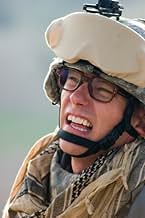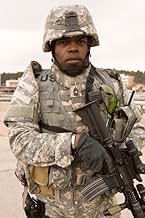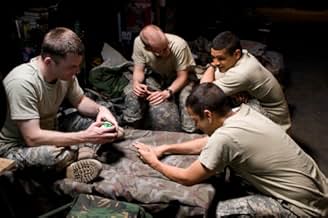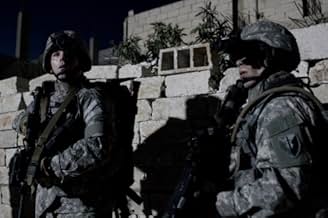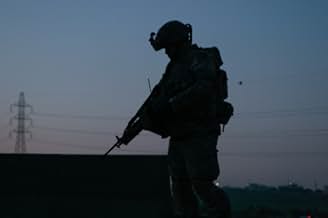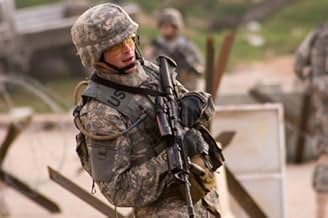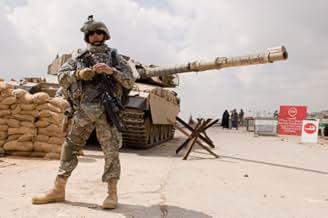The devastating reconstruction of the rape and murder of a 15-year-old Iraqi girl by American soldiers in Samarra in 2006.The devastating reconstruction of the rape and murder of a 15-year-old Iraqi girl by American soldiers in Samarra in 2006.The devastating reconstruction of the rape and murder of a 15-year-old Iraqi girl by American soldiers in Samarra in 2006.
- Awards
- 6 wins & 2 nominations total
Anas Wellman
- Soldier
- (as Anas 'Tipsy' Wellman)
Happy Anderson
- Battalion Commander
- (as Eric 'Happy' Anderson)
- …
- Director
- Writer
- All cast & crew
- Production, box office & more at IMDbPro
Featured reviews
Brian de Palma's Redacted ups the ante of protest films, fictionally recounting the rape and murder of a 14-year old Iraqi girl by U.S. soldiers in 2006. Using hand-held camera surveillance footage, Internet videos, excerpts from a French documentary and an Arab TV channel, Islamic fundamentalist websites, and the fictional camcorder diary of a young U.S. private, Redacted lets us know not only about the atrocities of war but about the unreliability of the way in which information is presented in the media and how we cannot trust what we see, even in his film.
Modeled after de Palma's earlier Casualties of War, Redacted searches for a truth in fiction that is deeper than reality-based documentary. Angel Salazar (Izzy Diaz) carries a video camera around shooting whatever he sees hoping to make a documentary that will be his ticket to film school. We are first introduced to his unit: Gabe Blix (Kel O'Neil), Lawyer McCoy (Rob Devaney), Sergeant Jim Sweet (Ty Jones) and good ol' boys, Reno Flake (Patrick Carroll) and B.B. Rush (Daniel Stewart Sherman). The videos make it apparent that our soldiers have lost their sense of purpose and are no longer on solid emotional ground.
The hand held video camera is then replaced by a French documentary about the soldier's routine at checkpoints in Samarra. Suddenly, a speeding car is approaching. Interpreting the signals by U.S. personnel to slow down as meaning they are being waved on through, the car is gunned down, killing a pregnant woman and her unborn child as the driver After a member of Salazar's unit is killed by a bomb, the two men who fired on the speeding car, Rush and Flake, invade the home of an Iraqi family in retribution and to enjoy the "spoils of war". In the middle of the night, they rape and murder a fourteen-year old girl, kill her family, and set the house on fire.
The sensitive Blix does not want to be involved with the mission, and McCoy goes along to try and prevent more harm but fails to stop the violence. Flake and Rush tell the rest of the company that any word of this incident will result in their death. The incident is seen only with a flickering light and the actual assault takes place off camera, but the scene nonetheless elicits a feeling of disgust. As if to try and show that the horrors of war are not limited to one side, de Palma shows the abduction and beheading of a U.S. soldier in very graphic terms. In the final gut wrenching sequence, a montage labeled "Collateral Damage" brings truth and fiction together as we see actual footage of Iraqi war victims mixed with staged deaths and faces that are redacted with black pens.
While Redacted is flawed by inconsistent acting and overly didactic add-ons, its impact is extremely powerful. De Palma indicts both the stupidity of the U.S. government for initiating the war, the complicity of the media in presenting us with a sanitized version of it, and a culture in which such atrocities are permitted to occur. Like the films of French director Bruno Dumont that show how meaningless violence generates more meaningless violence, the visceral impact of Redacted will stay with you for a long time. Slapping us in the face to show us how we have lost touch with the reality of war, the film is full of elemental passion, untidy, disjointed, and at times over-the-top, but in Dumont's words, it returns us "to the body, to the heart, to truth".
Modeled after de Palma's earlier Casualties of War, Redacted searches for a truth in fiction that is deeper than reality-based documentary. Angel Salazar (Izzy Diaz) carries a video camera around shooting whatever he sees hoping to make a documentary that will be his ticket to film school. We are first introduced to his unit: Gabe Blix (Kel O'Neil), Lawyer McCoy (Rob Devaney), Sergeant Jim Sweet (Ty Jones) and good ol' boys, Reno Flake (Patrick Carroll) and B.B. Rush (Daniel Stewart Sherman). The videos make it apparent that our soldiers have lost their sense of purpose and are no longer on solid emotional ground.
The hand held video camera is then replaced by a French documentary about the soldier's routine at checkpoints in Samarra. Suddenly, a speeding car is approaching. Interpreting the signals by U.S. personnel to slow down as meaning they are being waved on through, the car is gunned down, killing a pregnant woman and her unborn child as the driver After a member of Salazar's unit is killed by a bomb, the two men who fired on the speeding car, Rush and Flake, invade the home of an Iraqi family in retribution and to enjoy the "spoils of war". In the middle of the night, they rape and murder a fourteen-year old girl, kill her family, and set the house on fire.
The sensitive Blix does not want to be involved with the mission, and McCoy goes along to try and prevent more harm but fails to stop the violence. Flake and Rush tell the rest of the company that any word of this incident will result in their death. The incident is seen only with a flickering light and the actual assault takes place off camera, but the scene nonetheless elicits a feeling of disgust. As if to try and show that the horrors of war are not limited to one side, de Palma shows the abduction and beheading of a U.S. soldier in very graphic terms. In the final gut wrenching sequence, a montage labeled "Collateral Damage" brings truth and fiction together as we see actual footage of Iraqi war victims mixed with staged deaths and faces that are redacted with black pens.
While Redacted is flawed by inconsistent acting and overly didactic add-ons, its impact is extremely powerful. De Palma indicts both the stupidity of the U.S. government for initiating the war, the complicity of the media in presenting us with a sanitized version of it, and a culture in which such atrocities are permitted to occur. Like the films of French director Bruno Dumont that show how meaningless violence generates more meaningless violence, the visceral impact of Redacted will stay with you for a long time. Slapping us in the face to show us how we have lost touch with the reality of war, the film is full of elemental passion, untidy, disjointed, and at times over-the-top, but in Dumont's words, it returns us "to the body, to the heart, to truth".
Redacted (2007) **1/2
Redacted is an interesting and well intentioned, but nevertheless heavy handed picture. It's often a tough and unpleasant film to watch. Its style is unique and works quite well at times, while at others bogs the movie down to a halt.
Redacted is shot from different points of view, mostly through the video camera of private Angel Salizar, who was denied entrance into film school so he joined the army. He is obviously one of the central characters, but he's rarely seen on film; he's the one operating his camera and we hear him often speaking from behind it. This is his ticket into film school, a combat veteran with a video diary: who's going to deny him now? He tapes his buddies as they patrol Sumatra, play cards, and talk. When we're not watching his camera, we're watching either security cams, a documentary by a French crew on the soldiers, a news crew, or what appear to be videos posted on YouTube. It creates an interesting - if not totally successful - approach to narrative, and at times creates the sense that you are actually watching a documentary - which I'm sure was DePalma's intention.
I'm sure that everyone by now, given the massive controversy surrounding the film, knows what will happen. US soldiers go on a revenge raid after one of their comrades is killed by an IED. Drunk with rage, sexual deprivation, and sadism they storm a house they raided - for no apparent reason then either - days before and found nothing, but arrested the male head of the house anyway. They go back to rape the man's 15 year old daughter, and one of them kills her and her entire family. Salizar is one of the soldiers who goes, rigging his camera up to his helmet so as to be the fly on the wall, documenting what happens. Another soldier goes as well to make sure nothing happens, but is forced at gunpoint to not interfere.
I don't' think that redacted is an anti-soldier movie at all in reality. Most of the soldiers are disenchanted with the war, just want to go home and want nothing to do with the rape and want nothing more than to see justice done, but are forced to stay quiet. We get to see some scenes where one soldier is being persuaded by his father, an army man, to keep quiet, and an attack on his story by military superiors when he attempts to tell them. These scenes, especially the latter, I would have liked to see more of. After all the film is supposed to be about the way stories are suppressed and diverted when they are deemed unsavory to the credibility of the USA. The film gets bogged down in showing us how it's being made, when it should be showing us more of the "redaction," if you will.
The use of non-actors, or inexperienced ones, occasionally works to the advantage of the attempts to create a documentary like feel. When people know they are on camera, they get uncomfortable and the way the actors are not able to give movie star performances works to this end. However there are other times, particularly moments of big speeches that it works against it. It doesn't help that these speeches are almost always over the top and heavy handed. Moments of the film are nearly laughable, and those moments make this a hard film to review. On the one hand I want to call it a mess; on the other hand I would like to compliment its messiness. In the end though, Redacted simply is a bit too much of a mess to overcome its heavy handed and sluggish execution.
There are no actual problems with the message of the movie and it does not vilify the troops as a whole. I would even go so far as to say that it is quite even-handed when you consider the facts surrounding reality. If you are out of tune with reality, and still adhere to the false reality that the USA can do no wrong, then I'm sure you'll find it offensive.
There are a couple of shocking moments in the film. One includes an IED explosion, the killing of a pregnant Iraqi thanks to a misunderstanding at a checkpoint, and another scene involving a kidnapped soldier. The ending however is probably the most powerful, and gruesome portion of the film.
The final moments, under the heading "Collateral Damage," show the bloodied, dismembered, and dead bodies of Iraqi men, women and children - the only doctoring done, is the digital covering of their faces. On that note, I will take the same course as the film, and end this review.
Redacted is an interesting and well intentioned, but nevertheless heavy handed picture. It's often a tough and unpleasant film to watch. Its style is unique and works quite well at times, while at others bogs the movie down to a halt.
Redacted is shot from different points of view, mostly through the video camera of private Angel Salizar, who was denied entrance into film school so he joined the army. He is obviously one of the central characters, but he's rarely seen on film; he's the one operating his camera and we hear him often speaking from behind it. This is his ticket into film school, a combat veteran with a video diary: who's going to deny him now? He tapes his buddies as they patrol Sumatra, play cards, and talk. When we're not watching his camera, we're watching either security cams, a documentary by a French crew on the soldiers, a news crew, or what appear to be videos posted on YouTube. It creates an interesting - if not totally successful - approach to narrative, and at times creates the sense that you are actually watching a documentary - which I'm sure was DePalma's intention.
I'm sure that everyone by now, given the massive controversy surrounding the film, knows what will happen. US soldiers go on a revenge raid after one of their comrades is killed by an IED. Drunk with rage, sexual deprivation, and sadism they storm a house they raided - for no apparent reason then either - days before and found nothing, but arrested the male head of the house anyway. They go back to rape the man's 15 year old daughter, and one of them kills her and her entire family. Salizar is one of the soldiers who goes, rigging his camera up to his helmet so as to be the fly on the wall, documenting what happens. Another soldier goes as well to make sure nothing happens, but is forced at gunpoint to not interfere.
I don't' think that redacted is an anti-soldier movie at all in reality. Most of the soldiers are disenchanted with the war, just want to go home and want nothing to do with the rape and want nothing more than to see justice done, but are forced to stay quiet. We get to see some scenes where one soldier is being persuaded by his father, an army man, to keep quiet, and an attack on his story by military superiors when he attempts to tell them. These scenes, especially the latter, I would have liked to see more of. After all the film is supposed to be about the way stories are suppressed and diverted when they are deemed unsavory to the credibility of the USA. The film gets bogged down in showing us how it's being made, when it should be showing us more of the "redaction," if you will.
The use of non-actors, or inexperienced ones, occasionally works to the advantage of the attempts to create a documentary like feel. When people know they are on camera, they get uncomfortable and the way the actors are not able to give movie star performances works to this end. However there are other times, particularly moments of big speeches that it works against it. It doesn't help that these speeches are almost always over the top and heavy handed. Moments of the film are nearly laughable, and those moments make this a hard film to review. On the one hand I want to call it a mess; on the other hand I would like to compliment its messiness. In the end though, Redacted simply is a bit too much of a mess to overcome its heavy handed and sluggish execution.
There are no actual problems with the message of the movie and it does not vilify the troops as a whole. I would even go so far as to say that it is quite even-handed when you consider the facts surrounding reality. If you are out of tune with reality, and still adhere to the false reality that the USA can do no wrong, then I'm sure you'll find it offensive.
There are a couple of shocking moments in the film. One includes an IED explosion, the killing of a pregnant Iraqi thanks to a misunderstanding at a checkpoint, and another scene involving a kidnapped soldier. The ending however is probably the most powerful, and gruesome portion of the film.
The final moments, under the heading "Collateral Damage," show the bloodied, dismembered, and dead bodies of Iraqi men, women and children - the only doctoring done, is the digital covering of their faces. On that note, I will take the same course as the film, and end this review.
The thing we know for sure about de Palma is that there are no accidental or unintentional images, cuts, camera angles or words in his movies. What looks rough was intended to look rough. What looks like a careless frame was there to look careless. This film, like "Hi Mom" & "Greetings" (and even "Get to Know Your Rabbit) is not part of the Hollywood so many "reviewers" leaving their drivel in IMDb (aka the un-united statesmen) are either railing against or rallying behind.
As far as I could tell, this was a look at the world through De Palma's own Snake-eyes - via a camera, and a script HE wrote. It doesn't take a rocket scientist to know that a view of the world from his camera will not look like anybody else's, and most surely won't be subject to anybody else's rules or political agenda.
Back in the day when Martin Scorsese made "The Last Temptation of Christ," I got cornered next to a conversation of religious conservatives who were ranting about the "Jews who control of Hollywood" being behind Scorsese's film. I had to laugh -- and did. They all turned to look at me like I was next in line for the noose -- and so I pointed out that Scorsese was New York Italian Catholic -- and had contemplated the priesthood. And that he'd made so much money and reputation points for studios that no studio, executive, or other influencing body could or would try to influence or control the content of his films.
So again, there's a laugh here if you think De Palma is the tool of any studio, influential group, or left-wing agenda. The truth is, each filmmaker has a point of view that is their own - - or at least the ones who make the films we want to see.
And -- if you think Hollywood -- that herd of cats who make the entertainment which may well be our last exportable natural resource -- is wrangled into the lock-step of an agenda other than making money and making entertainment, then you've obviously never met a writer, an actor, a musician, an artist, a computer nerd, a designer, a makeup artist, a stunt coordinator, or an agent. As a group, the only thing they have in common is lust for MAKING. Individually -- their beliefs are as varied as Tom Cruise and Tom Waits. And their personal agendas may sometimes reach the light in the projector -- or the flash of paparazzi cameras -- or the blare of a talk show microphone.
But the statements made in these point-of-view films are artworks giving voice and image to the mind of the artist. Like Guerneca, Rhapsody in Blue, or Oliver Twist -- art is not just entertainment, beauty, or cleverness -- it is the expression of a personal agenda by its very nature. Artists are meliorists. They believe they can, and that they have the right, to change the world.
so get over yourselves. It's not a plot. It's free speech. And Brian De Palma has always been enamored of not so much speaking his mind -- as filming his mind.
As far as I could tell, this was a look at the world through De Palma's own Snake-eyes - via a camera, and a script HE wrote. It doesn't take a rocket scientist to know that a view of the world from his camera will not look like anybody else's, and most surely won't be subject to anybody else's rules or political agenda.
Back in the day when Martin Scorsese made "The Last Temptation of Christ," I got cornered next to a conversation of religious conservatives who were ranting about the "Jews who control of Hollywood" being behind Scorsese's film. I had to laugh -- and did. They all turned to look at me like I was next in line for the noose -- and so I pointed out that Scorsese was New York Italian Catholic -- and had contemplated the priesthood. And that he'd made so much money and reputation points for studios that no studio, executive, or other influencing body could or would try to influence or control the content of his films.
So again, there's a laugh here if you think De Palma is the tool of any studio, influential group, or left-wing agenda. The truth is, each filmmaker has a point of view that is their own - - or at least the ones who make the films we want to see.
And -- if you think Hollywood -- that herd of cats who make the entertainment which may well be our last exportable natural resource -- is wrangled into the lock-step of an agenda other than making money and making entertainment, then you've obviously never met a writer, an actor, a musician, an artist, a computer nerd, a designer, a makeup artist, a stunt coordinator, or an agent. As a group, the only thing they have in common is lust for MAKING. Individually -- their beliefs are as varied as Tom Cruise and Tom Waits. And their personal agendas may sometimes reach the light in the projector -- or the flash of paparazzi cameras -- or the blare of a talk show microphone.
But the statements made in these point-of-view films are artworks giving voice and image to the mind of the artist. Like Guerneca, Rhapsody in Blue, or Oliver Twist -- art is not just entertainment, beauty, or cleverness -- it is the expression of a personal agenda by its very nature. Artists are meliorists. They believe they can, and that they have the right, to change the world.
so get over yourselves. It's not a plot. It's free speech. And Brian De Palma has always been enamored of not so much speaking his mind -- as filming his mind.
I would give this movie 10 stars for the courage that the producers had shown to reveal the truth about was going on there in Iraq.
First of all I am an Iraqi who witnessed everything that happened since the first moment the war took place. I am not an American who is in favour of certain political wing or party. And it is really frustrating to hear those voices picking holes in De Palma's movie and accusing him of being biased or not knowing how the army operates or..or ..or ..etc. You don't need to know anything to be human!! and to stop killing, supporting, or covering for the killing of the innocents.
It is not about elections and politics!! it is about hundreds of people getting killed daily by different groups whether Al-Qaeda, the militias, death squads, or the coalition forces themselves!! The movie was so touching in every single aspect for an Iraqi who had lived there and witnessed the war. The combination of bad and good soldiers is so true. And choosing Sammara rather than any other province or city was so wise since the pressure and threat that the soldiers are under there is not the same for soldiers who are in rather safer areas like the Northern part of Iraq. Also the psychological pressure that most of those soldiers are under has been made clear in this movie; as well as, the negativity, hostility and racism of some soldiers..If you are an Iraqi who understands English, you can understand what the American soldiers mumble or yell about every time an Iraqi approaches them. You can tell from the look whether that soldier is a good or a bad one. Something that has been successfully shown and well presented in that movie.
Like most of the people who support the American army there and consider every Iraqi or Muslim a terrorist or "desert nig**r" or "rag head", most of the Iraqis and Muslims consider every troop a thief, raper, and occupier who is after money, oil and damaging or destroying Islam. But does that mean that they are right? they are both wrong!! All the movie did is that it put the reality of what is going on in Iraq in to cinema cause not all people follow the news or know which media to be trusted; moreover, it didn't say that those stories or characters are true or ever existed. And you don't need De Palma or the Fox news to tell you that!! May be it is true that they might not know a lot about Iraq, but what makes you think that you know better than them about Iraq??!!..
Another true and clever thing about the movie were the videos posted on the internet whether for the insurgents, soldiers' wives, or the people who oppose such disgraceful crimes. Also how, in the end, the innocent soldiers were the ones who pay for the crimes that their teammates commit whether physically (Salazar) or psychologically (McCoy).
First of all I am an Iraqi who witnessed everything that happened since the first moment the war took place. I am not an American who is in favour of certain political wing or party. And it is really frustrating to hear those voices picking holes in De Palma's movie and accusing him of being biased or not knowing how the army operates or..or ..or ..etc. You don't need to know anything to be human!! and to stop killing, supporting, or covering for the killing of the innocents.
It is not about elections and politics!! it is about hundreds of people getting killed daily by different groups whether Al-Qaeda, the militias, death squads, or the coalition forces themselves!! The movie was so touching in every single aspect for an Iraqi who had lived there and witnessed the war. The combination of bad and good soldiers is so true. And choosing Sammara rather than any other province or city was so wise since the pressure and threat that the soldiers are under there is not the same for soldiers who are in rather safer areas like the Northern part of Iraq. Also the psychological pressure that most of those soldiers are under has been made clear in this movie; as well as, the negativity, hostility and racism of some soldiers..If you are an Iraqi who understands English, you can understand what the American soldiers mumble or yell about every time an Iraqi approaches them. You can tell from the look whether that soldier is a good or a bad one. Something that has been successfully shown and well presented in that movie.
Like most of the people who support the American army there and consider every Iraqi or Muslim a terrorist or "desert nig**r" or "rag head", most of the Iraqis and Muslims consider every troop a thief, raper, and occupier who is after money, oil and damaging or destroying Islam. But does that mean that they are right? they are both wrong!! All the movie did is that it put the reality of what is going on in Iraq in to cinema cause not all people follow the news or know which media to be trusted; moreover, it didn't say that those stories or characters are true or ever existed. And you don't need De Palma or the Fox news to tell you that!! May be it is true that they might not know a lot about Iraq, but what makes you think that you know better than them about Iraq??!!..
Another true and clever thing about the movie were the videos posted on the internet whether for the insurgents, soldiers' wives, or the people who oppose such disgraceful crimes. Also how, in the end, the innocent soldiers were the ones who pay for the crimes that their teammates commit whether physically (Salazar) or psychologically (McCoy).
10g.barlas
I've read all the reviews above...... The American ones are thumbing down the film; and the rest of the world giving thumbs up... I join the latter group.... A courageous film (not a movie!); says what it wants to say in an understandable, simple way and yet becomes very moving.... This is not a film for people from NYC or Texas (see the very first reviews above); let them go to see the Transformers or Jumper; who'd rather sit back with a half a gallon soda in one hand and bucket of popcorn in the other and enjoy mindless flicks.. Finally an American filmmaker came up with a thinking-man's film and he is to be congratulated.. This film should be prized and shown to every war-blind and ignorant American who still blindly support the invasion of Iraq. Of course it is not a perfect film (one can never make a perfect film over such a horrible story) but yet very moving and pushing one to think over the empty definitions of NeoCons over democracy, freedom; liberty and humanity... A companion piece to In the Valley of Elah, I should say, and very well done Mr DaPalma...
Did you know
- TriviaThe scene where Salazar is smiling as he films a scorpion being devoured by ants is an homage to the beginning of Sam Peckinpah's The Wild Bunch (1969) where a group of children gleefully watch scorpions being eaten by ants .
- GoofsIn one scene, PFC Reno Flake refers to SPC Lawyer McCoy as a "Corporal" when in fact his rank is that of Specialist.
- How long is Redacted?Powered by Alexa
Details
- Release date
- Countries of origin
- Official sites
- Languages
- Also known as
- Örtülü gerçek
- Filming locations
- Production companies
- See more company credits at IMDbPro
Box office
- Budget
- $5,000,000 (estimated)
- Gross US & Canada
- $65,388
- Opening weekend US & Canada
- $25,628
- Nov 18, 2007
- Gross worldwide
- $784,604
- Runtime
- 1h 30m(90 min)
- Color
- Sound mix
- Aspect ratio
- 1.85 : 1
Contribute to this page
Suggest an edit or add missing content


